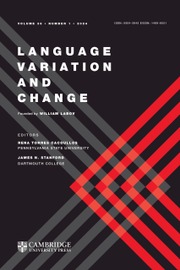Article contents
Contraction of negatives as evidence of variance in register-specific interactive rules
Published online by Cambridge University Press: 12 June 2009
Abstract
This study investigates the contraction of negatives in a carefully chosen corpus of discourse and writing, to permit comparison of the relative influences of various linguistic and social parameters on contraction. Evidence is presented that negative contraction is conditioned by interactional and other register variables. The point is made that the pragmatic as well as morphological interpretation of negatives entails that negative contraction and auxiliary contraction should be distinguished from each other. Although a Cognitive Prominence Principle predicts noncontraction when the negative conveys semantically focal information, a Social Agreement Principle predicts contraction. This is because it would be face-threatening (and, therefore, in conversation analysis terms “dispreferred”) to focus on disagreement, which is most often the semantic information conveyed by negatives. This hypothesis is examined using corpora which differ along several dimensions. The most important of these (for this study) appear to be the interactional versus informational register dimensions (Finegan, 1994). Data from instructional (workshop presentations), confrontational (political debates), and casual conversational material are contrasted with comparable reading style materials. The following general results are predicted. The Cognitive Prominence Principle will take over in informational contexts when disagreement is acceptable or neutralized. The Social Agreement Principle will take over in more interactional contexts where disagreement is not acceptable. The results are of interest to the student of focus, the sociolinguist concerned with dialect, register, and style variation, and even the speech technician.
Information
- Type
- Research Article
- Information
- Copyright
- Copyright © Cambridge University Press 1997
References
REFERENCES
- 12
- Cited by

